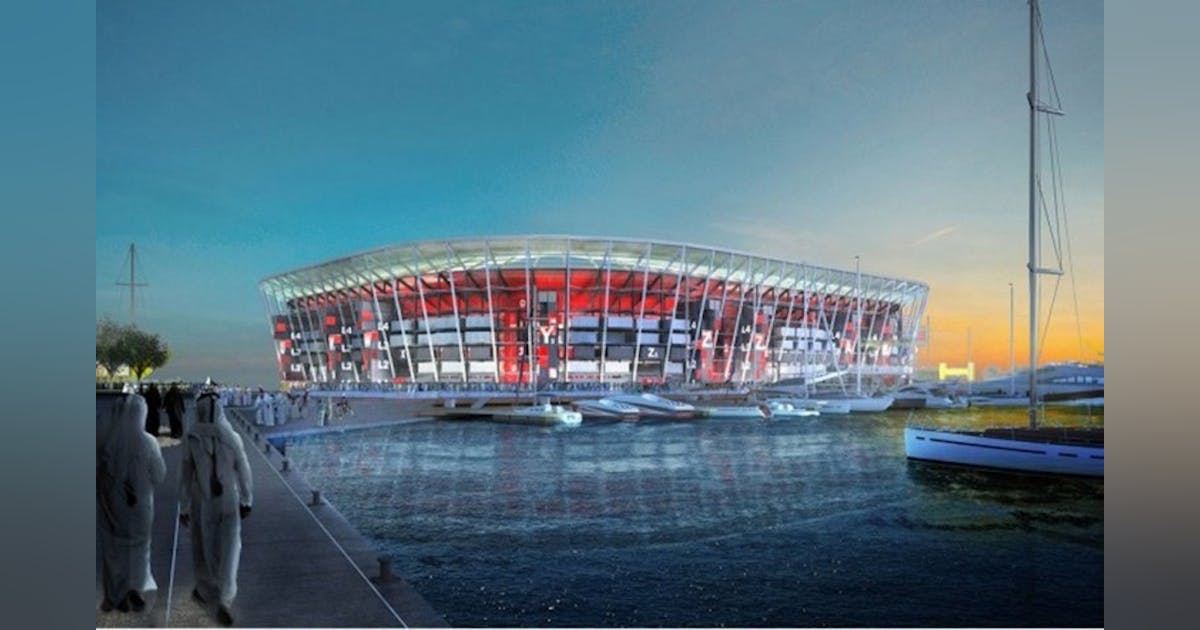Putting the World Cup in the spotlight: emergency lighting for Ras Abu Aboud Stadium
Ahead of the 2022 FIFA World Cup, Qatar has built nine new stadiums and renovated three, with the 12 venues spread across seven host cities. Situated on the shores of the Gulf, facing Doha’s West Bay skyline, Ras Abu Aboud Stadium is one of 12 new stadiums, a spectacular venue for matches through to the FIFA Cup quarter-finals. FIFA World Qatar 2022.
Built using shipping containers, removable seats and other modular “building blocks”, not only does this 40,000-seat venue have a striking design, but it is also zero carbon emissions and air-conditioned, and will be completely dismantled and refitted after the World Cup. His pieces will be used in other sporting and non-sporting projects, setting a new standard for sustainability and introducing bold new ideas to tournament legacy planning.
Given the temporary nature of the site and its clever modular design, fewer construction materials were needed compared to traditional stadium buildings, to reduce construction costs.
Reliable emergency lighting
When plans for the stadium began in 2020, the British lighting manufacturer Macwell has been committed from the start alongside its partner, Archilum Lighting, Mackwell’s Dubai-based lighting solutions expert. Together they designed and created all the emergency lighting arrangements for the stadium as well as its emergency lighting product specifications.
Stadiums are notoriously complicated to specify when it comes to emergency lighting. That’s why Archilum has partnered closely with Mackwell to help with the design and specification of the stadium’s emergency lighting.
Archilum, with advice from Mackwell, fully designed the emergency lighting layout and wiring and placed the correct luminaires for each of the different zones in accordance with all LUX calculations to ensure a compliant installation, optimizing the use of space throughout the building.
Provide optimal performance
Compliance is the #1 factor in any emergency lighting deployment, and Ras Abu Aboud Stadium was no exception. As all luminaires carry BSI’s highly decorated Kitemark approval, Mackwell provided emergency lighting that was not only able to meet Qatar’s civil defense requirements, but also capable of delivering the best possible performance in space. .
The Qatari subsidiary of NVC International, a seven-year partner of Mackwell’s, rolled out the products locally. The stages are complex. They have halls, VIP areas, changing rooms and, of course, stands. Everything in the stadium requires emergency lighting.
As part of the deployment, SmartCharge technology was used in emergency products, providing energy-efficient charging maintenance, lower operating temperatures and optimal NiMH battery life. With this technology, power consumption of emergency modules is typically reduced by up to two-thirds and with operating temperatures reduced by up to 10°C (50°F), battery life is also reduced. prolonged.
The end product
Mackwell supplied over 4,000 different luminaires for the project, split into eight different product families that met the specific requirements of all areas of Ras Abu Aboud Stadium. From emergency lighting fixtures to exit signs, all facilities were equipped with interfaces to other building management systems, ensuring that facility management teams would not have to manually test emergency lighting throughout the building. building. With the global rollout came the added benefit of providing an equally aesthetically pleasing and compliant emergency lighting system to help keep visitors and workers safe.
After starting initial designs for the emergency lighting layout in September 2020, all installations were finalized and completed in the first quarter of 2022, well before the World Cup kicks off in November 2022.


Comments are closed.